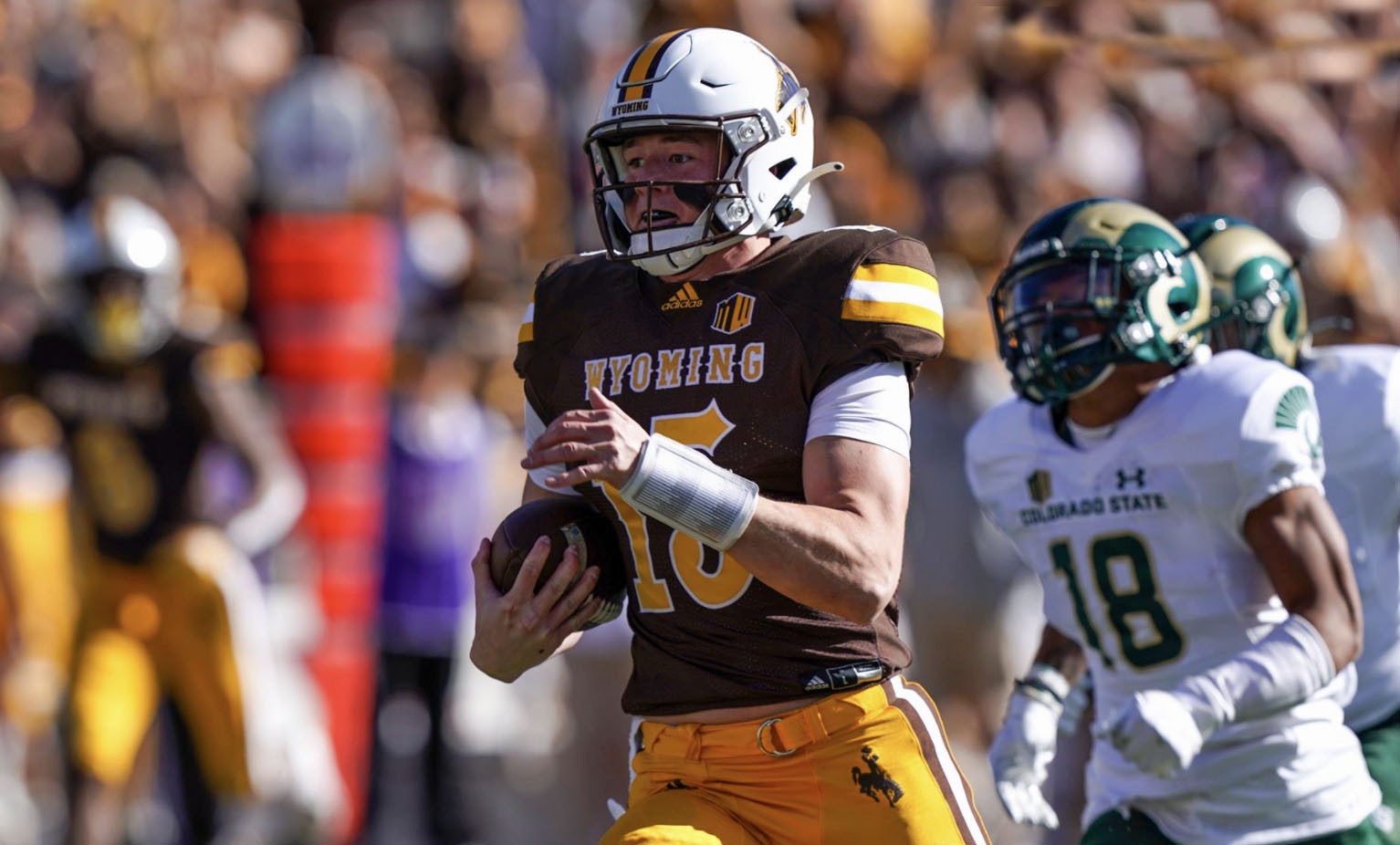Ray Hunkins
According to the website, “SB Nation”, there have been 107 outgoing Mountain West Conference scholarship football players who have entered the “Transfer Portal” as of December 28th. They range from a high of 18 players at CSU, which had a coaching change, to a low of 3 at San Jose State. Wyoming had 10 players enter the portal as of December 28th, including the two biggest stars of the Famous Idaho Potato Bowl, quarterback Levi Williams and wide receiver Isaiah Neyor.
At the same time, there were only 25 incoming players transferring to Mountain West Conference schools, and 10 of these were incoming to CSU. There were no transfers incoming to Wyoming.
Award winning sports writer Tracy Ringolsby reports in a Tweet that so far in 2021 there have been a total of 1,074 student athletes who entered the transfer portal, but only 28% of them (299) have received scholarships. 72% have not. They remain in the portal.
What’s going on?
On April 28, 2021 the NCAA Division One Board of Directors approved the transfer rule allowing athletes to transfer and compete, without sitting out a year, which was the previous rule for transfers. In doing so, the Board in its infinite wisdom created something akin to the NFL “Free Agency Rule” – with one big difference: In order to be a free agent in the NFL, the professional player has to complete the term of his contractual obligation.
Under the NCAA transfer rule, the student athlete is under no such obligation. He can commit to a four-year scholarship at a university one day, and enter the transfer portal six months later if he thinks practices are too tough or he misses his girlfriend back home too much.
What are we teaching these kids? Certainly, not to persevere. Certainly, not the virtues of loyalty and fidelity. Nor are we teaching them to keep their word and honor their commitments. Are there circumstances which might justify a transfer and application of the rule? Most certainly. But those circumstances are few and far between. “Acceptable circumstances” would exclude whimsical and capricious reasons so typical of 18-year-old, 19-year-old or even 20-year-old kids.
There are no guardrails for the new NCAA rule; there is no procedure for examining the circumstances and applying a rule to the facts of a particular situation. The NCAA has said, in effect, there are no rules, every man for himself. No need to keep commitments. Breaching a contract is OK if you are a player. If you don’t like practices or don’t like the coach or don’t get along with the first stringer, or are interested in a girl on another campus, get an agent and go for it!
Nice work, NCAA!
When the NCAA adopted the ill-advised rules making it “legal” for young athletes to transfer (including for reasons of self-aggrandizement), to hire agents, and to receive payment for name, image and likeness, it not only fundamentally changed college athletics, it opened the door to skullduggery.
The effect of the transfer rule is to discourage loyalty and unity in team sports and encourage, or at least allow, victimization and abuse of young athletes by the unscrupulous. Importantly and thankfully, the new rules are antithetical to Wyoming’s ethos and Code.
The NCAA rule, its effect and its application are not compatible with Wyoming standards. Wyoming and its University are different from most states and most state universities, in that our state has adopted explicit ethical standards designed to discourage disloyalty and breach of commitment.
Those standards can be found in the official Wyoming Code, adopted by the Wyoming Legislature, signed into law by the governor and appearing as a statute in Title 8 of the Wyoming Statutes (8-3-123). Its derivation is interesting.
After a 35-year successful career on Wall Street, Jim Owen wrote a book in 2004, Cowboy Ethics – What Wall Street Can Learn from the Code of the West. The book was a great success, so much so that the Wyoming Legislature in 2010 passed the bill mentioned above, declaring that The Code of The West was the official, “Wyoming Code”. The act was signed into law by Governor Dave Freudenthal on March 3, 2010. The Code is summarized by the following 10 principles set forth in the statute:
- Live each day with courage.
- Take pride in your work.
- Always finish what you start.
- Do what has to be done.
- Be tough, but fair.
- When you make a promise keep it.
- Ride for the brand.
- Talk less and say more.
- Remember that some things are not for sale.
- Know where to draw the line.
The Code addresses many of what we think of as “virtues”. Courage, self-discipline, responsibility, perseverance, honesty, and fidelity and loyalty, are all covered.
The oath of office specified by the Wyoming Constitution for all state officials, requires the official to swear or affirm that the discharge of duties will be, “with fidelity”. Fidelity means loyalty and faithfulness. The oath is consistent and congruent with the Code
As reported by the Casper Star Tribune recently, former Montana Governor, Marc Racicot, speaking of a provision in the Montana Constitution similar to Wyoming’s, defined fidelity: “Racicot, 73, said fidelity is faithfulness to a person, cause, belief, or country. He said it is demonstrated by loyalty and support without self-aggrandizement….” In the rural West, another way of expressing the concepts of fidelity and loyalty is, “ride for the brand”.
Fidelity was thought to be so important to teamwork in achieving the mission of the U.S. Marine Corps that it adopted Semper Fidelis, “always faithful”, as its motto in 1883. Fidelity of players to their team and the institution they represent is an important ingredient of team success.
The Code is aspirational to be sure, but it can also be said to be part of the ethos of Wyoming – the very spirit of our State and its people.
A few years ago, the University of Wyoming came up with a marketing slogan: “The World Needs More Cowboys”. It appears everywhere in the University’s promotional literature. Principle seven of Cowboy Ethics that became “The Code” later became the slogan for the UW Athletic Department. “Ride for the Brand” can be seen everywhere Wyoming Athletics are promoted.
That is why the revelation that ten members of the football team quit Wyoming and were seeking another school, was such a gut punch to all who love the University and support its sports teams.
It seemed on some level, that these young men, only partially but certainly purposely, enticed by “The World Needs More Cowboys” and “Ride for the Brand”, had violated Wyoming’s ethical code.
We should remember that these ten are only a fraction of the Cowboy football team, the vast majority of whom, “ride for the brand”. We should also remember that there may have been individual circumstances that justified a transfer from the University of Wyoming. We will never know because the NCAA rule does not require a student to justify his action in abandoning his commitment to attend and play football at UW.
That the ten had not adopted the Code as their own, that they had not finished what they had started, that they had broken a promise, that they violated the exhortation, “ride for the brand”, seems probable. That they were seeking to sell themselves to the highest bidder in an unseemly rush to the “transfer portal” also seems probable. The admonitions in the Code, “when you make a promise keep it” and, “some things are not for sale”, were ignored.
In The Book of Virtues, Bill Bennett writes, “…. Real loyalty endures inconvenience, withstands temptation, and does not cringe under assault.”
The ten who searched for greener pastures, violated the principles of loyalty and fidelity. I doubt they thought much about the Code or its sixth, seventh and ninth principles. They may not even have known there was a code, any code, and they may not have known “Ride for the Brand” is more than a slogan, it is an important principle for living a good life. They could have been exposed to those ideas.
An explanation of the Code and its importance to Wyoming, perhaps in an orientation, would be helpful to all students new to our state and most certainly to student athletes. It would be beneficial to teach the Code and why it is an important part of representing Wyoming on the fields of competition.
The NCAA Transfer Portal Rule makes it “legal” for young men to break their word and renege on their commitments. But as Stan Lynde, creator of the syndicated comic strip Rick O’Shay reminded us many years ago, “legal ain’t always right.”
Ray Hunkins is a retired country lawyer and rancher. He is a “Distinguished Alumnus” of the University of Wyoming.





